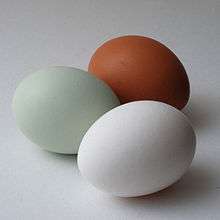Definify.com
Webster 1913 Edition
Ovum
‖
1.
(Biol.)
A more or less spherical and transparent cell, which by a process of multiplication and growth develops into a mass of cells, constituting a new individual like the parent; an egg, spore, germ, or germ cell. See Illust. of
Mycropyle
. ☞ The ovum is a typical cell, with a cell wall, cell substance, nucleus, and nucleolus. In man and the higher animals the cell wall, a vertically striated membrane, is called the
zona pellucida
; the cell contents, the vitellus
; the nucleus, the germinal vesicle
; and the nucleolus, the germinal spot
. The diameter of the ripe ovum in man and the domestic animals varies between 1-200 and 1-120 of an inch. 2.
(Arch.)
One of the series of egg-shaped ornaments into which the ovolo is often carved.
Gwilt.
Definition 2026
ovum
ovum
English
Noun
ovum (plural ova)
Synonyms
Hypernyms
Coordinate terms
Related terms
Translations
gamete
|
See also
Latin

ōva gallīnārum (hens' eggs).
Etymology
From Proto-Italic *ōwom, from Proto-Indo-European *h₂ōwyóm (“egg”), likely a derivative of *h₂éwis (“bird”) (whence also Latin avis (“bird”)). Cognates include Ancient Greek ᾠόν (ōión), Old Church Slavonic аицє (aice), Persian خایه (ḵẖāya), Old Norse egg (Norwegian, Icelandic, Faroese, English egg) and Old English ǣġ (obsolete English ey).
Pronunciation
- (Classical) IPA(key): /ˈoː.wum/
Noun
ōvum n (genitive ōvī); second declension
Inflection
Second declension.
| Case | Singular | Plural |
|---|---|---|
| nominative | ōvum | ōva |
| genitive | ōvī | ōvōrum |
| dative | ōvō | ōvīs |
| accusative | ōvum | ōva |
| ablative | ōvō | ōvīs |
| vocative | ōvum | ōva |
Derived terms
Descendants
References
- ovum in Charlton T. Lewis and Charles Short (1879) A Latin Dictionary, Oxford: Clarendon Press
- ovum in Charlton T. Lewis (1891) An Elementary Latin Dictionary, New York: Harper & Brothers
- OVUM in Charles du Fresne du Cange’s Glossarium Mediæ et Infimæ Latinitatis (augmented edition, 1883–1887)
- Félix Gaffiot (1934), “ovum”, in Dictionnaire Illustré Latin-Français, Paris: Hachette.
- Meissner, Carl; Auden, Henry William (1894) Latin Phrase-Book, London: Macmillan and Co.
-
(ambiguous) from beginning to end: ab ovo usque ad mala (proverb.)
-
(ambiguous) from beginning to end: ab ovo usque ad mala (proverb.)
- ovum in Harry Thurston Peck, editor (1898) Harper's Dictionary of Classical Antiquities, New York: Harper & Brothers